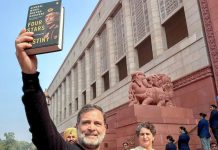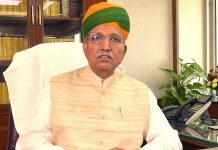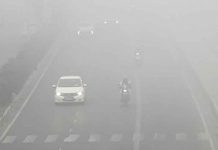
Speculations about fresh constitutional, administrative changes trigger deep anxiety in the Valley, reports RIYAZ WANI
Last week, a large troop deployment in Kashmir Valley followed by meetings with the home minister Amit Shah in New Delhi of the J&K Lieutenant Governor Manoj Sinha and the other top administrative and the security officials triggered a sense of de javu in the union territory.
In a replication of the suspense and fear among people in the run up to the withdrawal of Article 370 on August 5, 2019, the rumours flew thick and fast about the centre mulling fresh far-reaching constitutional and administrative changes in the former state ranging from a separate union territory for Kashmiri Pandits to the region’s further bifurcation into Jammu and Kashmir union territories or states.
The people grew nervous as the announcement was made that the Prime Minister Narendra Modi would address the nation at 5 pm on June 7. The apprehension was that the speech would be about announcing the changes in Kashmir. There was a sigh of relief as the address turned out to be about Covid-19.
But the speculations about the new changes being contemplated about Kashmir haven’t abated. The meetings of the top J&K functionaries including the LG with the home minister are seen as too noteworthy to be taken lightly. Sinha’s meeting with Shah came in less than 24 hours after the former met Union Home Secretary Ajay Kumar Bhalla. Other senior officials who were a part of the meeting included outgoing J&K chief secretary BVR Subrahmanyam, his successor Arun Mehta, Intelligence Bureau (IB) chief Arvind Kumar, J&K Director General of Police (DGP) Dilbag Singh and ADG, J&K Police CID. Reports about the meetings said that the upcoming Amarnath Yatra was one of the key agendas of these meetings. The central government is yet to decide whether the Yatra will be carried out as per schedule.
The annual pilgrimage to the 3888-metre-high cave shrine in south Kashmir Himalayas was cancelled last year due to the Covid19 pandemic. This year too, following a surge in Covid-19 cases and deaths across the country including J&K, the Shri Amarnath Shrine Board (SASB), which manages the affairs of the pilgrimage, suspended the registration of pilgrims on April 22 which had started on April 1.
In 2019, the pilgrimage was cut short by about 15 days before the central government’s August 5 decision.
While yatra is an important issue considering its security dimensions and the ongoing pandemic, a slew of top level meetings about it are thought to be unwarranted, hence speculations about the centre mulling more changes in Kashmir.
Some major changes being speculated about are bizarre: People expect steps such as further division of J&K into Kashmir and Jammu, South Kashmir being made a part of Jammu, a union territory within Kashmir being carved for the Kashmiri Pandit community etc. On a positive note, some also expect restoration of statehood to J&K.
But as things stand, the last prospect looks unlikely. So do the other speculations, but considering that the centre has earlier done unthinkable in regard to Kashmir – such as repealing Article 370 and bifurcating J&K into two union territories — they have acquired a ring of plausibility.
Restoration of statehood
As for statehood, the centre is understood to not be in favour of doing it until it has completed the process of fresh delimitation of Assembly seats. And to this end, a delimitation commission was been working for the last one and a half years.
The delimitation exercise is due to change the electoral game in the Valley. The commission set up by the government is likely to enhance the seats for Jammu making it politically at par with Kashmir.
If that happens, a Jammu based party like the BJP would have more political weight in the future J&K Assembly. And even if a Kashmir based party were to form or lead a future government, it would have little maneuvering space to carry out its agenda or overturn many of the laws passed by the New Delhi backed administration over the past two years.
This is why the National Conference (NC), whose core base is in the Kashmir Valley is sceptical of the commission and has refused to join it. The party with three MPs has so far chosen to boycott the commission terming it illegal.
“In our view, the Jammu and Kashmir Reorganisation Act, 2019 is palpably unconstitutional and has been enacted in disregard and violation of mandate and spirit of the Constitution of India and therefore not to be acted upon,” the party’s MPs said in the letter earlier this year to the chairperson of the Delimitation Commission Justice (retd) Ranjana Prakash Desai.
But now the NC seems to have had a change of heart. The party has decided to reconsider its decision to participate in meetings of the commission following the party’s recent virtual meet where some leaders have batted for such a move. Now the NC president Dr Farooq Abdullah will take a final call on what the party will do.
“It is only once the delimitation commission completes its exercise that any decision to restore the statehood could be expected,” said Naseer Ahmad, a columnist. “So any decision on statehood may not be expected in near future”.
Other measures
Would the centre go ahead with an anticipated move to further divide the union territory or carve out new administrative divisions? Though it appears unlikely, such possible measures do align with the BJP’s ideological outlook on Kashmir. For example, the BJP would like to create a separate enclave for Kashmiri Pandits in the Valley
In February 2020, home minister Amit Shah said that the government will create townships in all the 10 districts of the Valley for the resettlement of Kashmiri Pandit community. He assured the members of the community that a blueprint for the purpose was being given final touches. The plan also involves the renovation and rebuilding of temples destroyed since the outbreak of separatist militancy three decades ago. The home minister is also reported to have sought help from the Pandit groups to assist the government in compiling a database of all the properties that had either been occupied or encroached upon so that the government could initiate redressal mechanisms to restore the property to the rightful owner.
India-Pakistan angle
Any further changes in Kashmir, however, would face a severe opposition from Pakistan and jeopardize the nascent thaw in the relations between the two neighbors following what is deemed to be an ongoing back-channel dialogue.
Already Pakistan taking note of the speculated changes in Kashmir has asked New Delhi not to go ahead with them. Commenting on reports of possible “further division, bifurcation and demographic changes” in Kashmir, Pakistan Foreign Office spokesperson Zahid Hafeez Chaudhri said “no new instrument of occupation shall have any legal effect.”
“We call upon the international community, including the United Nations, world parliaments, international human rights and humanitarian organisations and global media to take immediate cognisance of the situation. India must be stopped from any further illegal action in the occupied territory,” Pakistan said. Should any changes be made, this could once again sour India, Pakistan relations, something that may not be in the interest of regional peace.
tehelkaletters@gmail.com











